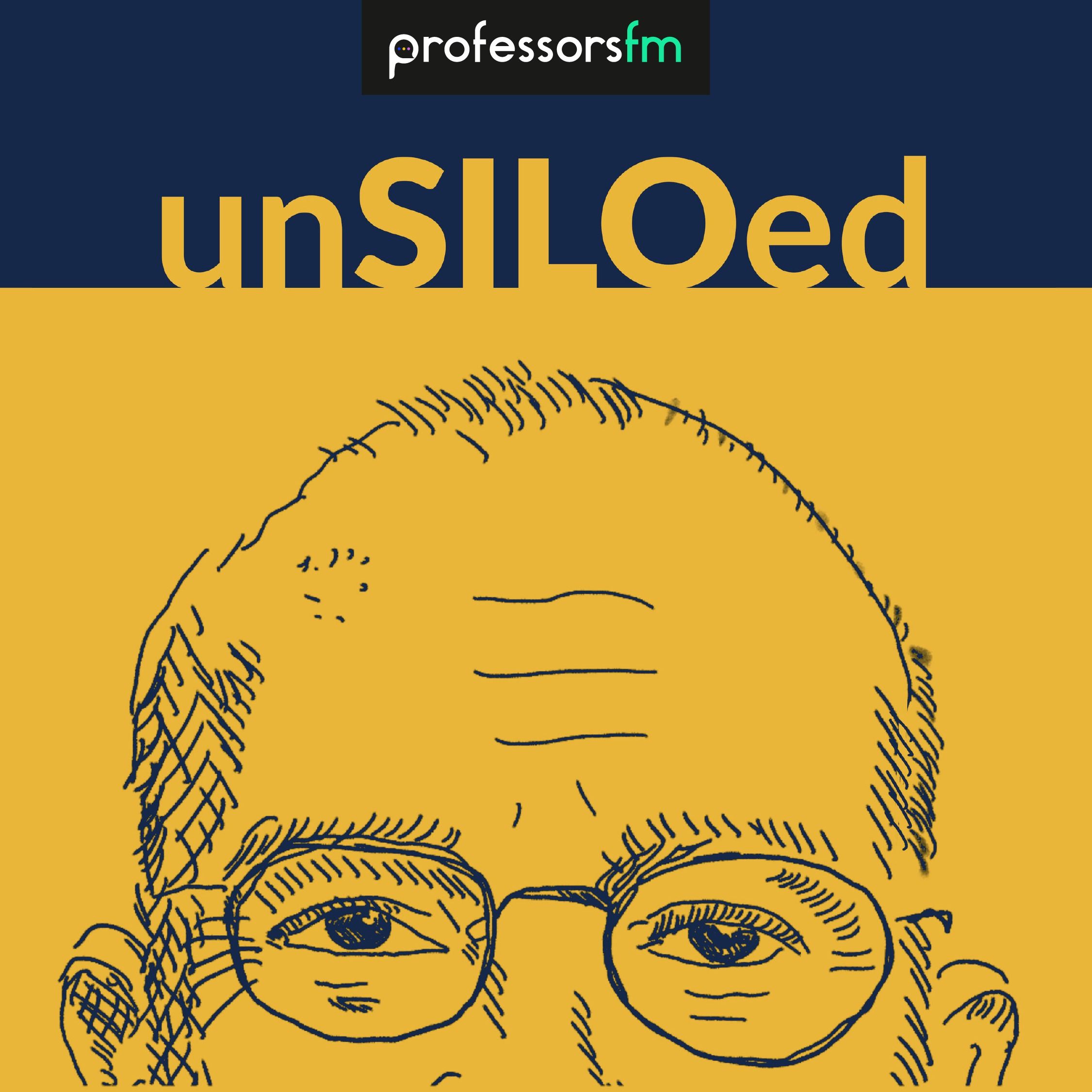

unSILOed with Greg LaBlanc
Greg La Blanc
unSILOed is a series of interdisciplinary conversations that inspire new ways of thinking about our world. Our goal is to build a community of lifelong learners addicted to curiosity and the pursuit of insight about themselves and the world around them.*unSILOed Podcast is produced by University FM.*
Episodes
Mentioned books

Oct 31, 2024 • 37min
476. AI's Potential for Positive Social Change feat. Juan M. Lavista Ferres
Juan M. Lavista Ferres, Corporate Vice President and Chief Data Scientist at Microsoft, introduces fascinating insights from his book, 'AI for Good.' He discusses the transformative potential of AI and satellite data to tackle social issues, emphasizing the importance of responsible data collection. Juan delves into real-world applications like helping the visually impaired with currency recognition and the ethical implications of open AI access. The conversation highlights Microsoft's shift towards a culture that balances profit with philanthropic initiatives, showcasing the human benefits of AI.

Oct 28, 2024 • 44min
475. Unraveling The History of Economic Crises with Harold James
Harold James, a professor at Princeton University and author of 'Seven Crashes: The Economic Crises That Shaped Globalization,' dives deep into how historical economic crises have influenced global relationships. He explores the evolution of crises and their connection to wars, including lessons from World War I and the impact of the Bretton Woods Agreement. Through fascinating anecdotes, he uncovers the complexity of interconnected economies and the importance of learning from past economic upheavals to address contemporary challenges.

Oct 24, 2024 • 47min
474. Common Sense in the Discourse on Sex and Gender feat. Doriane Lambelet Coleman
In this engaging discussion, Doriane Lambelet Coleman, a Duke Law professor and author focusing on women and sports, unpacks the complexities of sex and gender. She emphasizes a balanced approach to understanding biological differences and transgender rights. The talk dives into the historical evolution of legal rights, the impacts of significant court cases, and the unique challenges women face in sports amidst these debates. Coleman calls for empathy and clear definitions to navigate these contentious topics, bridging divides for better discourse.

Oct 21, 2024 • 56min
473. The Evolution of Intelligence with Neil D. Lawrence
Neil D. Lawrence, a machine learning professor at Cambridge and author of "The Atomic Human," dives into the fascinating intricacies of intelligence. He explores whether AI can ever replicate human intellectual traits. The conversation highlights pivotal historical advancements in technology, the nuances in defining intelligence, and the relationship between organizational culture and innovation. Lawrence also reflects on his experiences at Amazon, showcasing how intelligence—both human and artificial—evolves and transforms in our digital age.

Oct 18, 2024 • 56min
472. The Endless Quest to Define Humanity: Exploring Prehistory feat. Stefanos Geroulanos
Stefanos Geroulanos, a history professor at NYU and author of 'The Invention of Prehistory,' joins to discuss the complexities of defining human nature. He explores the historical narratives around race, species, and Western civilization, unpacking their ongoing impact today. The conversation delves into the debates on human progress and how archaeological discoveries reshape our understanding of identity. Geroulanos also critiques Eurocentric historical classifications and discusses the intersection of science, politics, and our evolving perceptions of humanity.

Oct 14, 2024 • 49min
471. Why It’s Time For Evolutionary Science to Evolve with David P. Mindell
David P. Mindell, an evolutionary biologist and visiting scholar at UC Berkeley, discusses a transformative view of evolution in this engaging conversation. He challenges the traditional tree-like model of evolution, introducing the concept of horizontal evolution and its importance. Mindell highlights the roles of genetic transfer in evolution, the ethical stakes of gene editing, and the implications for fields like medicine and agriculture. He also reflects on the interplay between parasites and symbiotes, revealing the dynamic nature of relationships across species.

Oct 10, 2024 • 51min
470. Understanding Macroeconomics During Volatile Times with Philipp Carlsson-Szlezak
Philipp Carlsson-Szlezak, global chief economist at Boston Consulting Group and author of "Shocks, Crises, and False Alarms," discusses the critical need for business leaders to grasp macroeconomic principles in turbulent times. He highlights the misconceptions stemming from traditional economic models and underscores the importance of personal judgment. Key topics include lessons from past crises, the dual nature of dollar hegemony, and the complexities of inflation trends, all aimed at equipping executives to make informed decisions in an unpredictable landscape.

4 snips
Oct 7, 2024 • 57min
469. The Importance of Learning by Doing feat. Matt Beane
In this discussion, Matt Beane, an assistant professor at UCSB and author of The Skill Code, delves into the impact of technology on on-the-job learning. He highlights the need for practical experience, especially in high-stakes fields like surgery, and argues for the importance of embracing discomfort in the learning process. Beane also explores the roles of mentorship, workplace culture, and the dynamics between experts and novices, emphasizing that effective skill development requires challenge, complexity, and meaningful connections.

Oct 3, 2024 • 1h 1min
468. Art Thinking and Innovative Business Models feat. Amy Whitaker
Amy Whitaker, an educator in Arts Administration at NYU and a prolific author, dives into the importance of creative thinking in business. She discusses how artistic mindsets can help navigate challenges in today's tech-driven landscape, including the impact of AI and the rise of NFTs. Whitaker emphasizes the value of flexibility and ‘good enough management’ in fostering creativity. They explore how art and economics intersect, advocating for an interdisciplinary approach that merges creative processes with business acumen.

Sep 30, 2024 • 55min
467. Understanding Human Behavior in Economics with Vernon L. Smith
Vernon L. Smith, a Nobel-prize winning economist and emeritus professor at Chapman University, dives into the intersection of human behavior and economics. He highlights how Adam Smith's lesser-known theories on moral sentiments offer insights into behavioral economics. The discussion points to the psychological dynamics in asset trading, emphasizing the cycles of overconfidence and regret. Smith advocates for a collaborative academic approach and reinterprets Smith's classic works to enrich modern economic understanding.


